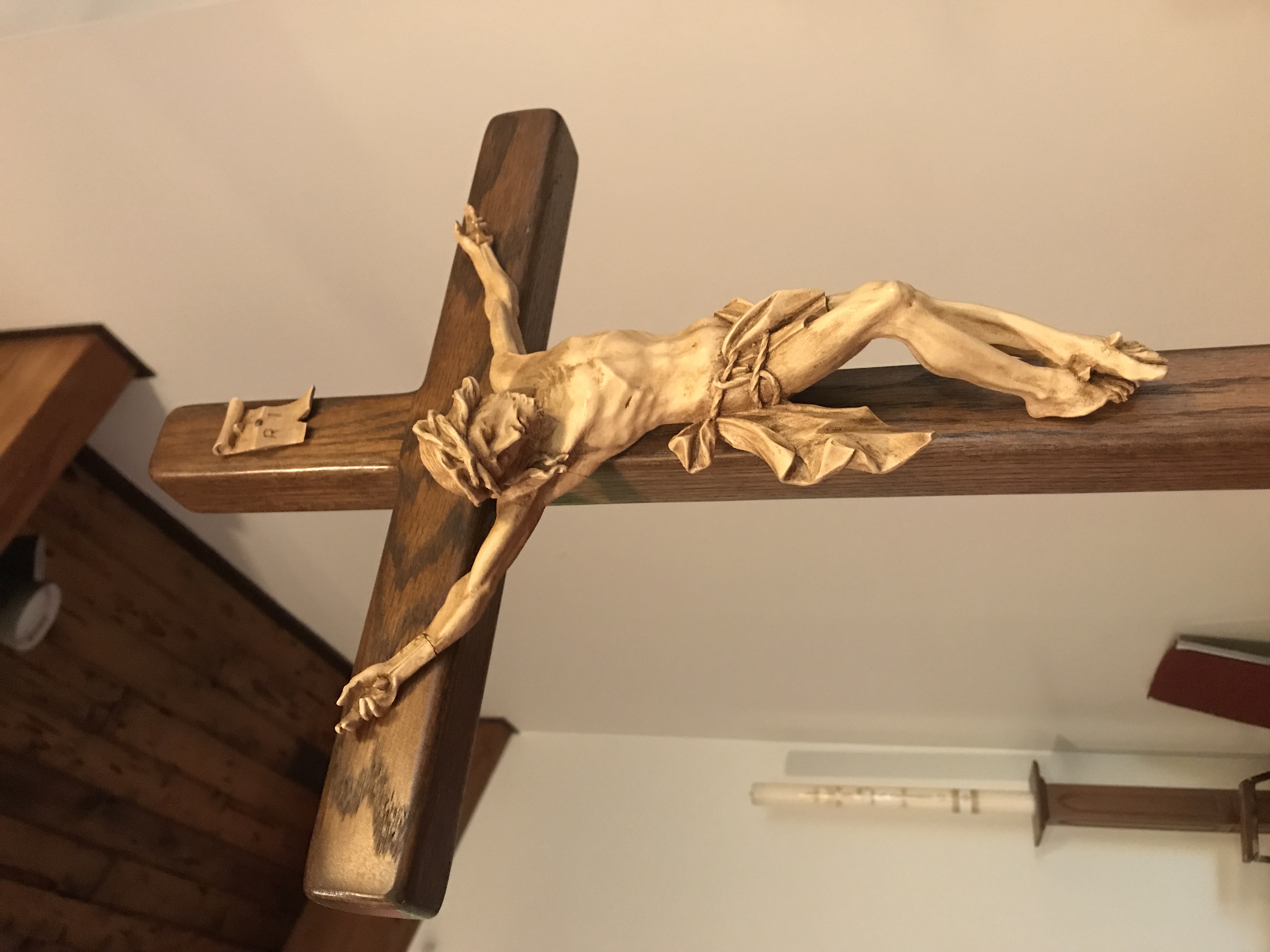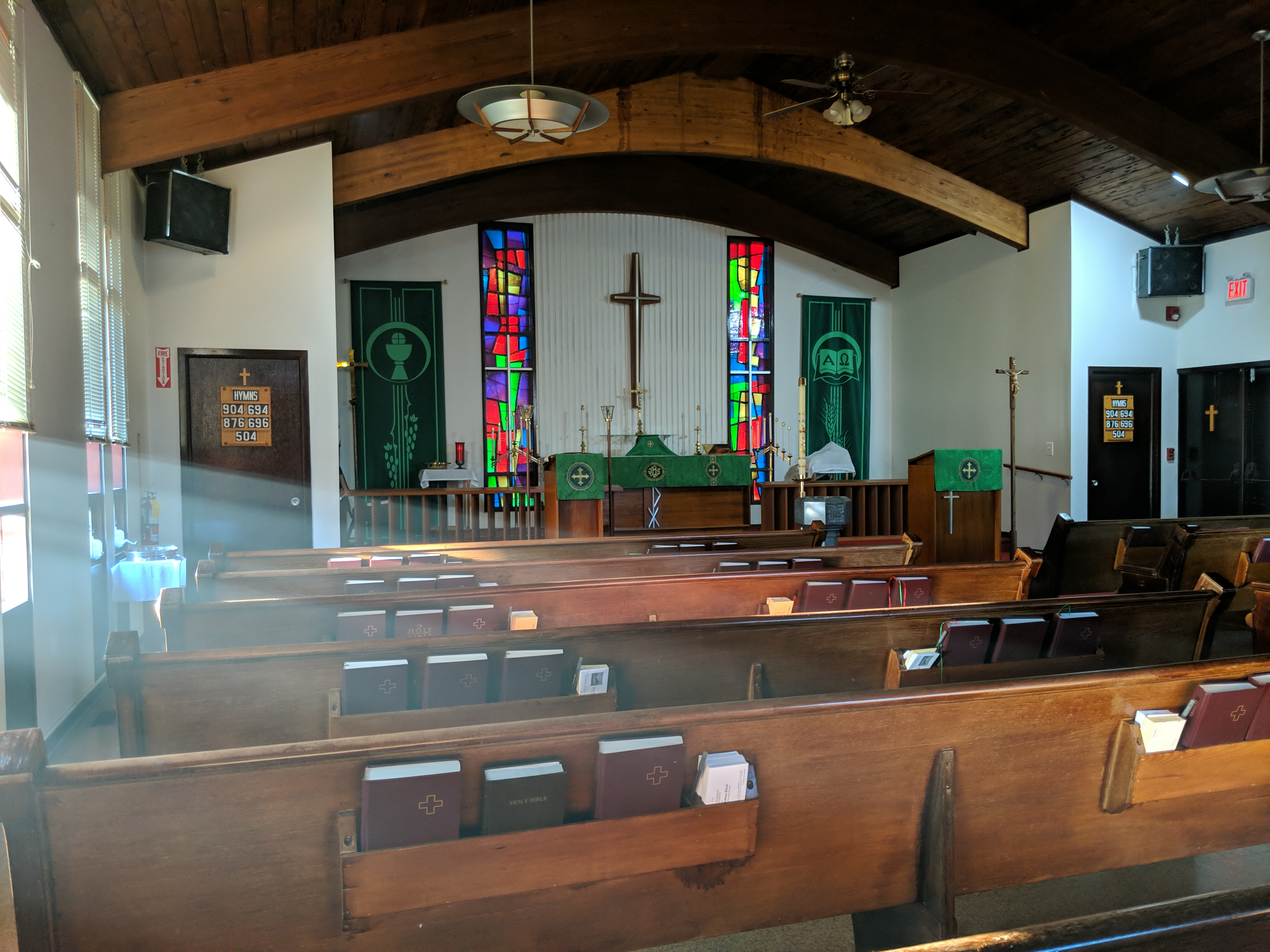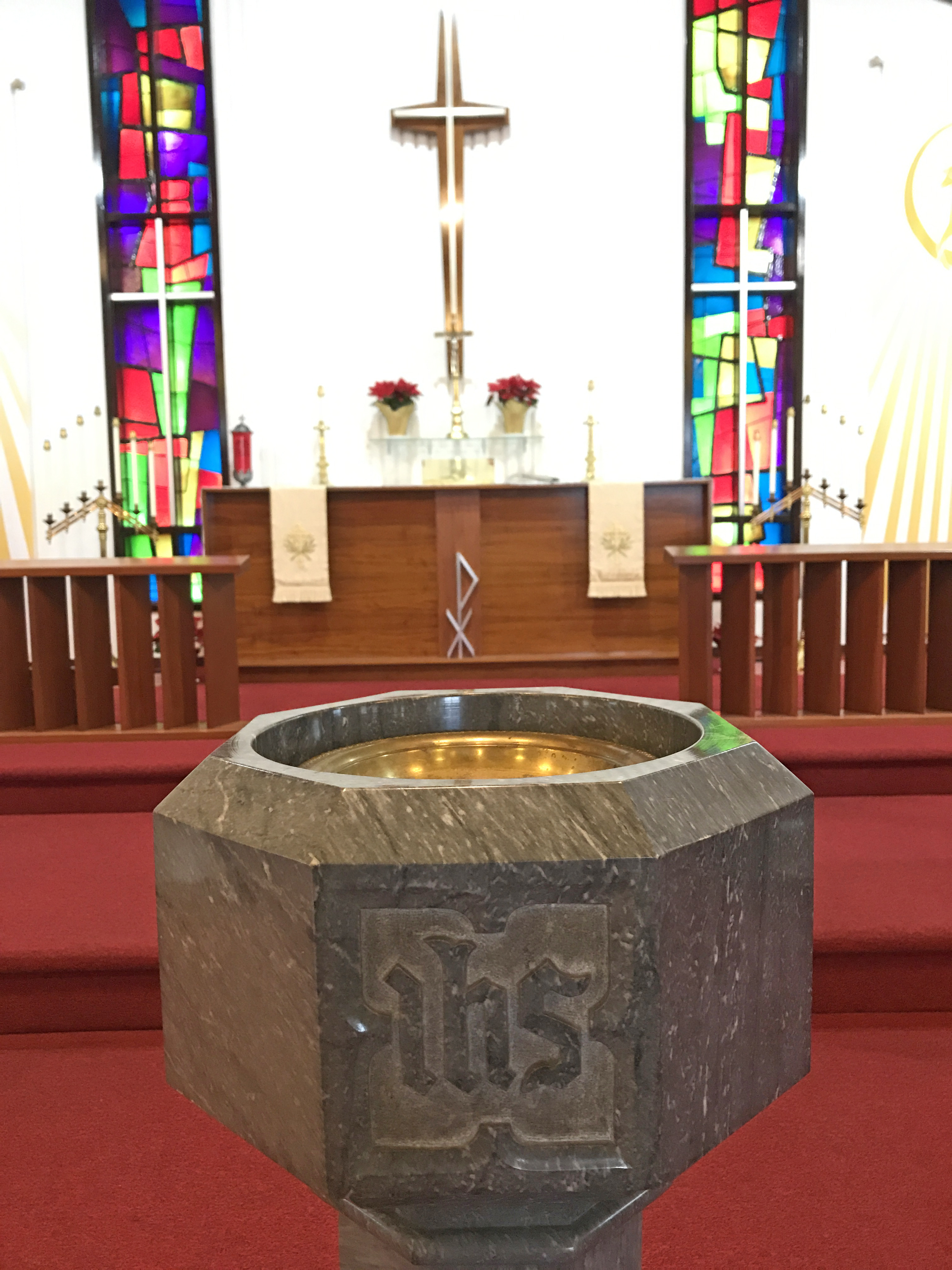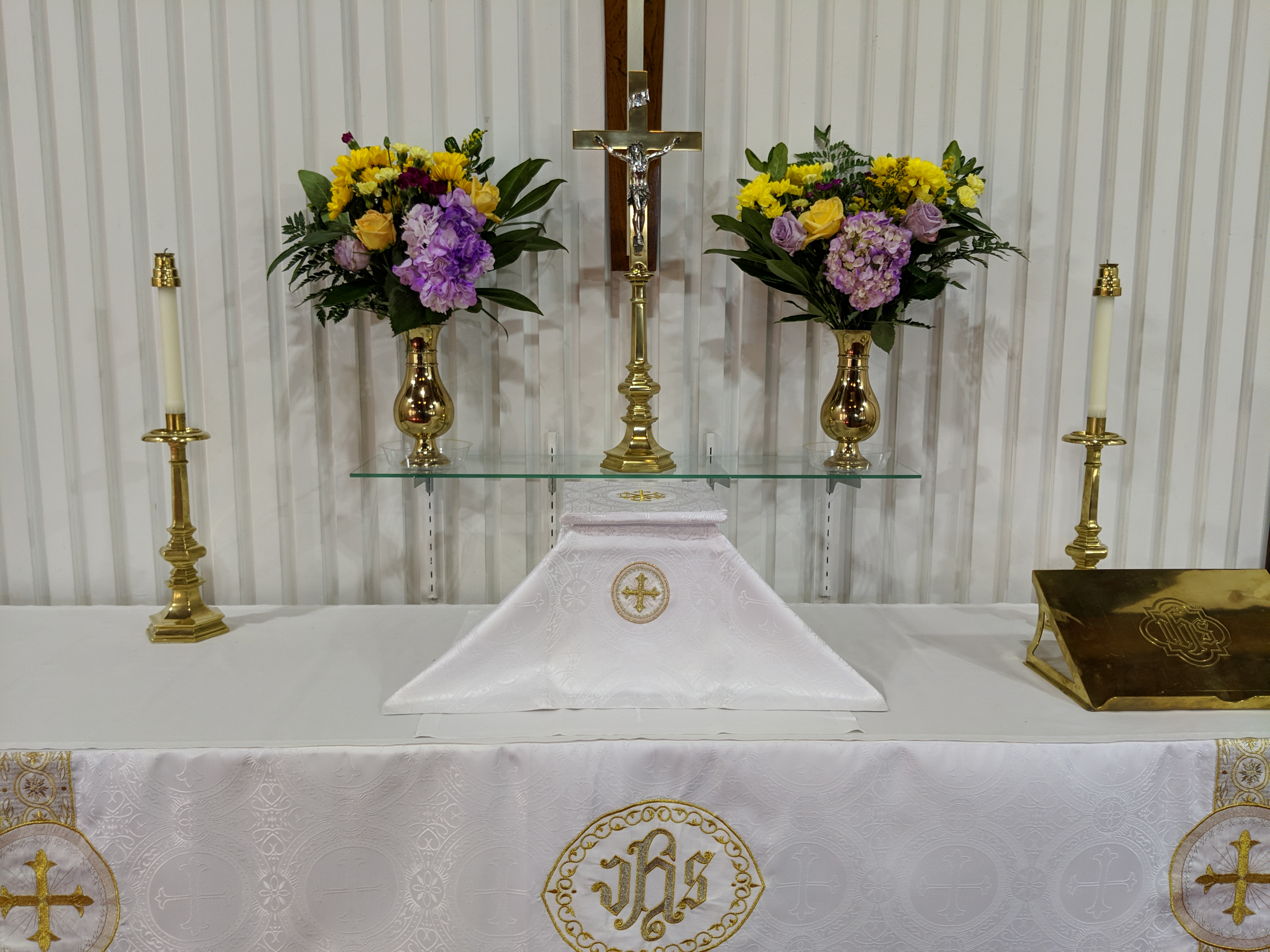Quasimodo Geniti – Sunday 7 April A✠D 2024
✠ Psalmody: 1 Peter 2:2a; Psalm 81:1, 7, 10, 16b;St. Matthew 28:7b; St. John 20:26a, c
✠ Lection: Ezekiel 37:1-14;1 John 5:4-10a;St. John 20:19-31
Alleluia, Christ is risen! He is risen indeed, Alleluia!
In the Name of the Father and of the ✠ Son and of the Holy Spirit. Amen.
Nearly all fear is unwarranted, regardless of the threats of this world, and regardless of our misconstrued fears of God Himself. Nearly all fear is unwarranted, especially for the Christian heart, especially in the fresh news of Christ’s resurrection from the dead. His victory over the grave is not only a putting to death of the old man of sin and a rising to walk in the newness of life for all who believe and are baptized into His Name, but it is a brutal and violent defeat of all of Christ’s enemies, just as we sang at the beginning of service, “Who is this that comes from Edom, All His raiment stained with blood…Why that blood His raiment staining? ‘Tis the blood of many slain; Of His foes there’s none remaining, None the contest to maintain. Fall’n they are, no more to rise; All their glory prostrate lies.” Christ’s blood be upon us and our children to wash us as white as snow. Christ’s enemies’ blood be upon Him as testament to His righteous victory over and judgment of them. Both are good news for us, and for our fear, that He graciously cleanses us while treating His enemies thus.
The enemy within is defeated yet rages on until we part ways with him forever in our gracious Christian death. That old man stirs up daily all kind of mischief, unbelief, despair, and fear. The disciples, having abandoned their betrayed Lord, fleeing in fear from the Garden of Gethsemane just three days prior, continue in it even having heard that Jesus’ tomb is empty. Their fear was likely not restricted to dreadful risk of similar physical harm, treatment, and crucifixion as their Lord’s at the hands of the vicious Jews, but also of one embarrassment that their King had not restored the Kingdom to Israel the way for which their earthly eyes and hearts had longed. To live as a disciple of Jesus is to live among many temptations to fear. Does this Kingdom, the only eternal one, which Christ has established by His glorious death and resurrection, bring about any fear within you, where only joy should arise? Do you fear God getting too much up in your business that you try to keep to yourself in mind and heart? Do you fear this world more than you do the One out of Whose hand it may never snatch you even though it persecute you, confiscate your possessions, or execute you? Do you fear embarrassment by ridicule or insult of your Chirstian faith and the Christ to Whom it clings when your Savior gives opportunity to confess and defend the hope that lies within you? Do you fear that God will let you down when the world demands answers to its ungodly questions and demands? Do you fear what might happen to our church if something doesn’t change? How about intimate honesty with God and yourself to which He calls you as you wait and see? Do you fear to be a godly man or woman and live out the true Christian life in public and in private, even when it’s just you and Jesus watching? Relief from these and all fears does not come from us pulling ourselves up by the bootstraps, but by seeing that unless the LORD builds the house, they labor in vain who build it. Jesus tears down His enemies, but builds up those Who abide in His Word as He speaks peace to you, through the work of the Holy Spirit, in the sure forgiveness of sins. Therefore, if you want church growth, if you want certainty, if you want a calm spirit not tossed about by the winds of a dying culture, then see first what Christ seeks to do in you. Your glorified, risen Lord gives the very things that we need to overcome all fear and to live only in the healthy, repentant fear of God.
Jesus gives to His beloved bride, the Church, the very people of God who belong to one body with Him as the Head, the gift of His Word by which He serves us as we read, mark, learn, and inwardly digest it. And He especially and most importantly serves us as He speaks His word of Peace in the assembly of saints as we here respond to Him with the very words that He has given to bless us. The Divine Liturgy is a gift from above, a sacred time and place set apart from this evil age, from this evil world, a time and place in which heaven meets earth and God bestows on us His grace. His Word is a means of grace, a way in which the grace He possesses comes to us. Blessed is he who hears My word and keeps it. His Word accomplishes that for which He sends it forth.
When the children of Israel were in fear of their Egyptian oppressors, God spoke to them a promise of the bloody destruction of their enemies by means of a sacrificed lamb which would protect them from the destruction set to visit every household. Those who had faith in His Word and covered their doorposts and lintels with the shed blood of an unblemished lamb escaped death as it passed over them in judgment and struck down all the firstborn of God’s enemies. Without the Word of the LORD promising that the shed blood of the lamb, and the meal provided by its given flesh, was a deliverance from death, the blood was simply lamb’s blood and the meal just a roasted rack eaten in haste, and nothing more. But with God’s Word, it was an instituted Passover as a one-time means of grace, delivering the people in that moment by the shedding of blood. Even greater was it pointing ahead to the shed blood of Jesus Christ, the very Paschal Lamb of God, Whose blood was poured out once for all for the sins of the world. By the words recorded by the Holy Evangelists Matthew, Mark, Luke, and St. Paul, the greater meal than the Passover that we now have is the one done in remembrance of Him at His holy altars, wherein we Christians, cleansed by His sacrifice, eat the true food of His Flesh and drink the true drink of life that is His Blood in Holy Communion.
Also, when Israel came out of Egypt to the Red Sea, they feared the wrath of pharaoh and his army, for great destruction and wrath of man were bearing down on them. But God’s word turned those impassable waters into a blessed flood that parted for His children so that they could pass through on dry ground and be delivered safely to the other side. In repenting of fear and turning instead to trust in the Lord to bring about life where only death is apparent, the Red Sea waters were made to be a means of grace to them, according to God’s Word. The same waters were death for their enemies as the LORD drowned them all in that holy washing away. In response, His people sang a joyful song to their victorious LORD by whose mighty right hand they were delivered and their enemies vanquished. Those waters pointed ahead to your Holy Baptism, which now saves you; water that returns for you daily to drown the old Adam within, that you may walk in the newness of life, without fear, because whoever believes and is baptized will be saved. You possess heavenly treasure of immeasurably greater worth than all the things this world works 24/7 to convince you to worry about and have fear over.
Holy Communion and Holy Baptism are two very specific means of grace that we commonly call Christ’s sacraments. We believe, teach, and confess that in order for something to be called a sacrament, it has to have three characteristics: 1) it bestows the forgiveness of sins; 2) it is instituted by Christ; and 3) it is connected to an earthly element, or substance. Communion (God’s Word with Bread and Wine) and Baptism (God’s Word with water) are the same in this three-part definition, yet both are beautifully unique in their purpose and function in the life of the Church. Baptism is a one-time event with ongoing, daily effects, while the Supper is given for us to eat and drink as often as we do this in remembrance of Jesus, so that we become like What we eat. Thanks be to God that He has given us a day of rest each week in which we may come to be refreshed in body and soul by our risen Savior to live without fear; without fear of the world, and without fear of Him. The sacraments are the gifts by which He both prepares us for the eternal life ahead while strengthening and preserving us in the present.
Yet Christ is even richer in His grace than this, for He instituted yet another gift which is for our use to drive out fear of sin, death, and the devil. He gave it to us in the upper room that same resurrection day. At evening, being the first day of the week, when the doors were shut where the disciples were assembled, for fear of the Jews, Jesus came and stood in the midst, and said to them, “Peace be with you.” When He had said this, He showed them His hands and His side. Then the disciples were glad when they saw the Lord. So Jesus said to them again, “Peace to you! As the Father has sent Me, I also send you.” And when He had said this, He breathed on them, and said to them, “Receive the Holy Spirit. If you forgive the sins of any, they are forgiven them; if you retain the sins of any, they are retained.”
Found in this comforting text is the special authority which Christ has given to His Church on earth to forgive the sins of repentant sinners, but to withhold forgiveness from the unrepentant as long as they do not repent. The public exercise of this authority of Christ is given to pastors to make use of for the joyous benefit of Christ’s sheep as another institution that is just as valuable as Baptism and the Lord’s Supper. You witness this authority being exercised to your aid at the beginning of every Divine Service. It is good to prepare for the reception of God’s Holy Word and Blessed Sacrament by making a general confession of your sins and by receiving absolution from the pastor in the stead and by the command of Jesus Christ. That general practice is good as a preparation rite, yet the gift that Christ gave in the upper room is grander, because our sins aren’t generic, nor is His forgiveness of them. Our sins are specific and differently troublesome for each one of us. Where one may struggle with worry, for another anger or being quarrelsome is the vice. Where one sins by lust, for another it is drunkenness. Where one is lazy, another is a gossip, and so on. These are specific sins that love to lurk in the dark, hoping not to be named or brought out either into the full light of the law’s condemnation or into Christ’s forgiveness. The Devil and your sinful nature enjoy you keeping your confession generic, because just like issues with your home, computer, car, and body, specifics are important in dealing with what the troubles the soul.
The catechism teaches that before God we should plead guilty of all sins, even those we are not aware of, as we do in the Lord’s prayer. The preparation rite at the beginning of Divine Service fits into this distinction, for in it we give a general plea of guilty of all sins. But Absolution, that is forgiveness, is gifted by Christ as a potent weapon against your sins as you name them in their dark details into the ear of the one called by Christ to serve in His stead in your midst. It has no earthly element as do the two sacraments of Baptism and the Eucharist, yet Absolution is a means of grace that most certainly bestows the forgiveness of sins and it is instituted by Christ for Christians to trust in as you battle daily against specific sins, including all those that stir up ungodly fear within you. Yes, the idea of meeting privately with your pastor to confess the ugliest things about yourself is disconcerting, but only because this gift has fallen into disuse. Its regular practice brings out the beauty of the gift. It need not sit idly by when it is meant not to be distasteful to you, but a strengthening of your faith by Christ’s merciful gift. I encourage you to take up your Catechism, (we have plenty of copies in the narthex, A Simple Explanation of Christianity), read the part on Confession, then the part on the 10 Commandments and their meanings. Also, read the pamphlet, PRIE, then look over the rite of Individual Confession and Absolution on page 292 in your hymnal. You’ll see that it is a simple rite that delivers this instituted blessing of Christ to you clearly and effectively, ending in the words Go in peace. Call me, email me, text me, ask me any and all questions you may have that will help you understand this gift of Christ awaiting you, because I’ll gladly discuss with you how it works. This gift is available for you for whenever you’d like to make an appointment with me. It would be an immeasurable delight of mine to bestow this additional blessing of Christ upon you, because if we were to take turns naming our sins out loud before Divine Service, we’d never have Divine Service, which is why Luther continues, saying, but before the pastor (privately, one-on-one), we should confess only those sins which we know and feel in our hearts. He speaks of private confession that happens outside of Divine Service. Forgiveness of sins isn’t generic, but specific, which is why Christ has given the gift of one-on-one confession to you. It is available. It is my responsibility and pleasure to serve you in this way. It is not my brother, but my delight to make use of this institution for you. It is an institution of Christ placed before you for you to make use of as often as you’d like; not because you have to or that if you don’t, you’re a poor excuse of a Christian. No. That’s looking at Christ’s gift the wrong way. Come at it from the perspective of the bounty of the Gospel, for we Lutherans are most certainly ones to maximize the gifts of God, not to think or see what minimal amount of Christ we shall get by with in our lives. His is a Kingdom of Grace in which He spreads before you a constant feast of life delivered by various means of grace. Remember that by His Word, your cup runneth over. He desires for you not a bare minimum of Him by which you’re struggling, not able to comprehend this life, trying to dodge or alleviate fear on your own, but to live in an abundance of His peace, for that He gladly gives to you and promises to keep doing so in His means of grace. If you come to your pastor, Christ’s ordained servant of the Word, repentant and confessing sins, you are guaranteed to hear and receive Christ’s forgiveness. That’s how it works and that’s why it is so marvelously strengthening to your faith. You are promised by your Savior to walk away having received forgiveness as from Christ Himself. His desire is that you see the blessings that He bestows in all that He has instituted for you in His well-fought victory over His foes and yours. He has boundless grace and forgiveness to pour into you; through Baptism, through the Sacrament of the Altar, through Confession and Holy Absolution. By His Word in these means, He speaks His peace to you, through the work of the Holy Spirit, in the sure forgiveness of sins, for by them your victorious risen Lord casts out all fear and replaces it with the light of life and hope. This is how your Victor King comes to you in victory over your sins.
Alleluia, Christ is risen! He is risen indeed, Alleluia!
In ✠ Jesus’ Name. Amen.















Comments are closed, but trackbacks and pingbacks are open.